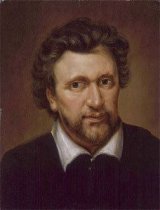Analysis of To electra
Robert Herrick 1591 (London) – 1674 (Dean Prior)
I dare not ask a kiss,
I dare not beg a smile;
Lest having that, or this,
I might grow proud the while.
No, no, the utmost share
Of my desire shall be,
Only to kiss that air
That lately kissed thee,
| Scheme | ABAB CDCD |
|---|---|
| Poetic Form | Traditional rhyme Quatrain |
| Metre | 111101 111101 110111 111101 11011 1101011 101111 11011 |
| Closest metre | Iambic trimeter |
| Characters | 199 |
| Words | 44 |
| Sentences | 2 |
| Stanzas | 2 |
| Stanza Lengths | 4, 4 |
| Lines Amount | 8 |
| Letters per line (avg) | 19 |
| Words per line (avg) | 5 |
| Letters per stanza (avg) | 74 |
| Words per stanza (avg) | 21 |
Font size:
Submitted on May 13, 2011
Modified on April 23, 2023
- 13 sec read
- 213 Views
Citation
Use the citation below to add this poem analysis to your bibliography:
Style:MLAChicagoAPA
"To electra" Poetry.com. STANDS4 LLC, 2024. Web. 27 Apr. 2024. <https://www.poetry.com/poem-analysis/31435/to-electra>.


Discuss this Robert Herrick poem analysis with the community:
Report Comment
We're doing our best to make sure our content is useful, accurate and safe.
If by any chance you spot an inappropriate comment while navigating through our website please use this form to let us know, and we'll take care of it shortly.
Attachment
You need to be logged in to favorite.
Log In